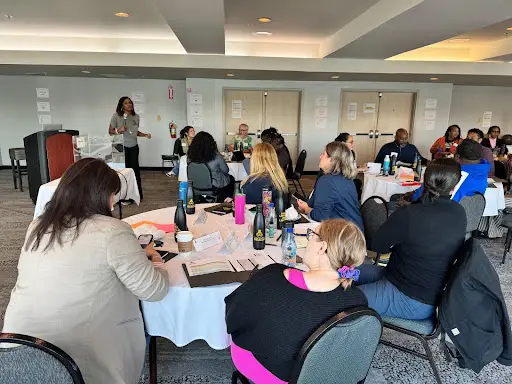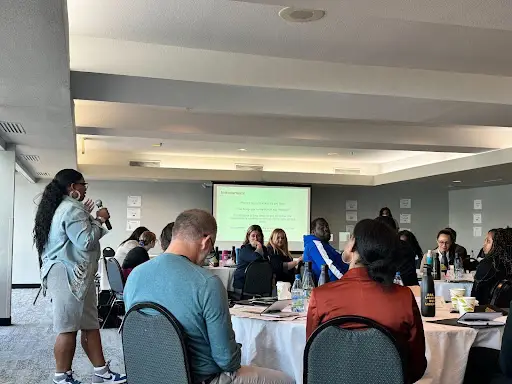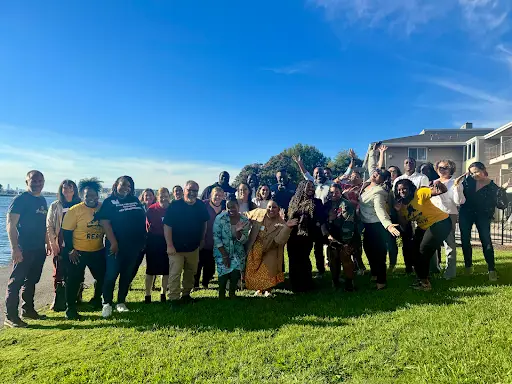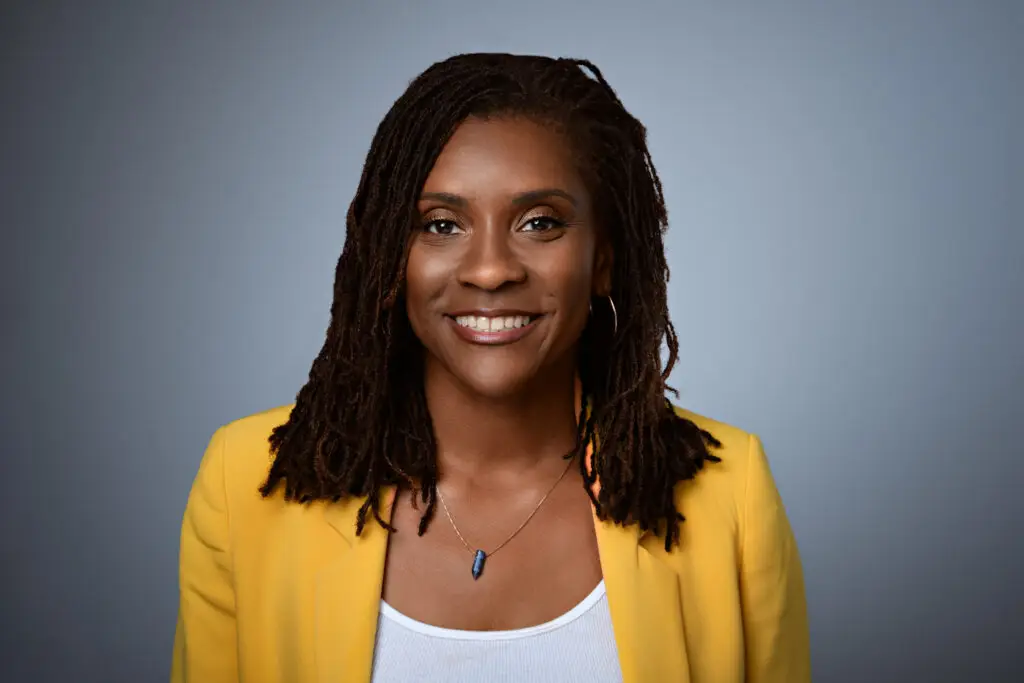Note: The Oakland REACH’s second REACH Way Institute will take place in spring 2024. Sign up for our newsletter if you’d like to receive updates.
This past November was a dream come true for The Oakland REACH—and for me as a leader. For two days, leaders from Rochester, Birmingham, New Orleans, Greenville, Jacksonville, Providence, Boston, and San Francisco, Richmond, and Oakland, CA, gathered together for our first-ever REACH Way Institute (RWI).
These leaders represented the opportunity to impact 350,000 students. I still cannot find the right words to express how much it meant to have groups from all over the country come to learn—not just from us, but from one another. We built an instant community that affirmed just how critical leader collaboration is.
Why do I believe in this kind of collaboration so firmly? First, for many of us, our capacity-building support comes from funders. While our funders are critical, being in a space with fellow leaders who are in the trenches with you feels different— that space is an opportunity to build winning work without the inherent pressures that come from meeting funders’ expectations. The second big reason is the relentless focus on tangible solutions. We are the leaders staring directly in the face of the literacy and math crisis in our cities every single day. This keeps us up at night. As a result, we jumped right into collaborative approaches and scalable solutions—nothing theoretical, all practical. in

The best, most powerful moments during the Institute were the ones that were off script—I could show that, as a fellow leader, I closely understand the very real challenges, burdens, and opportunities. It quickly became clear that we have to be more honest about what it takes to deliver results if we’re going to create meaningful change across the country. Leaders doing the work are the only ones who can provide real talk: Real talk about culture, strategy, funding, and partnerships.
In the weeks that followed, I had an opportunity to reflect on key takeaways from our first Institute.
#1: People before programming: Our highest rated session during RWI was called “Building Bold for Your Communities.” I put all my cards on the table about the infrastructure it took to make our game-changing Liberator Model happen. You can’t move great work without a great team.
Too often, conferences and convenings dive straight into the programming—skipping right over the work it took to create a fertile ground for that programming to thrive. But so many of us leaders in these conferences are thinking in the back (or, more likely, the front) of our minds: “How am I going to get my team working at this level to move like this?” One leader shared, “We always go straight into programming at the events I attend. It was refreshing to focus first on the culture and strategy. It was great to know we are not alone in our struggles.”
I won’t lie, this was a tough conversation. REACH’s culture has been strong, and our culture has been weak. We have learned from both, so I talked about both. For REACH, this has meant focusing on both the behavioral and technical skills we need to successfully move our work forward. On the behavioral side, we’ve worked with our team to develop curiosity to ask good questions, as well as resilience to keep moving when things shift. On the technical side, we’ve focused on project management and strategic thinking. Developing your team is the key responsibility of leaders.
#2: Money, Money, Money: RWI attracted a large number of Black leaders from across the country, primarily from the South and East Coast. During the Institute, we were transparent about how our fundraising approach supports us in building scale and impact.
We also understand the stark reality that faces Black-led organizations. Black “grassroots or community-based” leaders struggle with attracting, sustaining, and growing funding for the long haul. According to a report released by the Young, Black & Giving Back Institute, “about 76.8 percent of such nonprofits are operating on a budget of less than $500,000 a year, and nearly one-third operate with just $30,000 a year.”
With almost a decade in this work, REACH has figured out how to be in the 25% of organizations who have a budget to do transformational work. Money looks different in every state our participants traveled from, but worrying about funding and sustainability is par for the course for Black and brown-led CBOs. REACH has established five readiness criteria for implementing our model: Culture for Change, Leadership Capacity, Funding, Customer Relationships, and Stakeholder Relationships.
We designed criteria to allow organizations to self-assess their readiness. For the funding criteria, we have also added a financial readiness assessment so that organizations can plan with full transparency. We are also seeing an increased interest from districts who want to learn more about our model. With ESSER/Covid-19 relief dollars phasing out later this year, we are excited about the potential to have local CBOs and districts at the table, collaborating together on how to implement this model in their cities. We believe it is our duty to bring even more collaboration, transparency, and community to “money, money, money” so we all have more impact in the lives of our Black and brown students and families across the country.

#3: Collective leadership is the only way: I think one of the things that surprised the participants the most was my insistence that you have to work with the system to deliver results. Participants were eager to learn more about why and how. The short answer is that kids are in our public schools. If we want to reach the most kids, we’ve got to go where they are. It’s not easy, but it’s the right approach. The fact that Oakland’s Superintendent came to speak on a panel during RWI was a testament to our mutual belief that we see one another as true partners in this work. If we didn’t take our Liberator Model into the district, we’d never be able to impact the 16,000 students we’re reaching now. Collective leadership is the only way to improve our school systems for our students. Shame will not get us there.
We are excited about RWI and our legacy journey to build a national network to scale bold work and transform families and communities. We’ve built solutions that work, and now we’re going to share everything we can to help scale those solutions—the challenges are too great and too urgent for leaders to not put everything on the table. RWI will never be about having all the answers, but it will always be about driving leaders to bolder solutions.






Don’t engage families: Liberate them
Lakisha Young
Senior Fellow